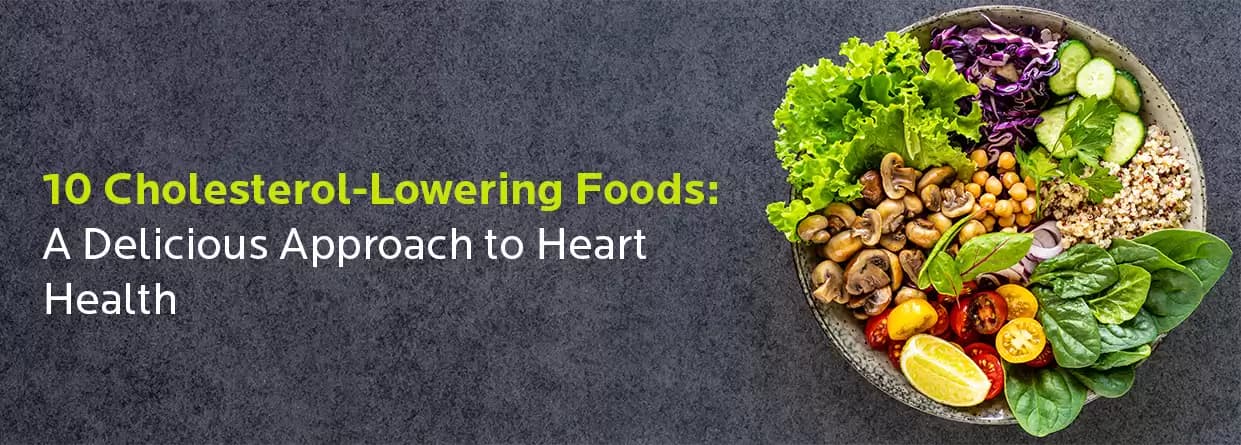
If you suspect that you have high cholesterol levels and might have heart issues, book your appointment with the only best cardiac hospital in Kolkata, BM Birla Heart Research Center in Kolkata.
In the world of constant technological advancement and hectic work-life schedules, these days it has become difficult to look after health and keep an eye on the health problems that can occur in the early stages of life. One of the problems that requires regular monitoring is the management of cholesterol levels. If the levels of cholesterol are high, not only does it lead to serious health problems but increases the risk of heart problems. Hence, the only way to maintain the levels of cholesterol is by including cholesterol-lowering foods. This is one of the most delicious approaches to maintaining good heart health.
If you suspect that you have high cholesterol levels and might have heart issues, book your appointment with the best cardiologist in Kolkata, BM Birla Heart Research Center. The healthcare experts not only ensure proper diagnosis but also offer the right treatment options depending on the patient’s condition.
If you are looking for information on what to eat to lower cholesterol, then you have come to the right place. In this blog, we will talk about the list of foods to reduce cholesterol levels and maintain good heart health. However, kindly note that it is research-based information and we do not interfere with the cardiologist's consultation in any way.
One of the most important lipids for body functions, cholesterol is either formed by the liver or comes from particular foods. Both low-density lipoprotein (LDL) and high-density lipoprotein (HDL) carry it through the bloodstream. LDL also known as bad cholesterol increases the risk of heart issues by causing artery plaque to build up. HDL also known as good cholesterol returns extra cholesterol to the liver. For heart health, it is essential to keep an eye on LDL and HDL levels. Exercise and diet have a primary influence on cholesterol levels, with trans and saturated fats increasing LDL. Regular exercise and a healthy diet are essential for general and overall well-being. By enabling individuals to make informed decisions, knowledge of cholesterol promotes good cardiovascular health.
It is significant to keep cholesterol levels low to protect cardiovascular health. Increased levels of cholesterol, mainly low-density lipoprotein (LDL), are associated with the growth of arterial plaques, which narrow blood vessels and enhance the risk of heart disease and stroke. These illnesses are the primary causes of morbidity and mortality globally. People can efficiently control their cholesterol by leading a heart-healthy diet, getting involved in regular physical activity, and averting excessive amounts of saturated and trans fats. Controlling cholesterol lowers the risk of growing serious cardiovascular problems, eases the workload on the heart, and increases blood flow. Making low cholesterol a priority is a proactive step toward preserving general health and preventing potentially fatal cardiovascular diseases.
Lowering cholesterol levels can be massively assisted by eating a cholesterol control diet. Notably, the key to effective management of cholesterol levels is an integrated approach to diet and lifestyle including regular exercise. For personalized assistance, people with particular health concerns must get in touch with a healthcare provider. A proactive approach to maintaining cardiovascular health and general well-being is to make educated and informed dietary decisions. Here are some of the food categories that are known for lowering cholesterol:
In a nutshell, including foods that lower cholesterol in your diet can hugely improve heart health. A versatile and diverse approach that includes whole grains, fruits, nuts, fatty fish, and vegetables is what holds the power. Oats, berries, and olive oil are nutrient-dense foods that help in effectively lowering cholesterol. Remember that what counts in your meals is what you put in them as much as what you leave out. By involving these dietary modifications in addition to leading an overall healthy lifestyle, you form the base for a heart-healthy journey. Ensure that the list of foods is your priority to build a better basis for cardiovascular health and a happier, healthier life.
Written and Verified by:

Dr. Shuvo Dutta is a Senior Consultant in Cardiology Dep. at BM Birla Heart Hospital, Kolkata, with over 34 years of experience. He specializes in radial and femoral angioplasty, complex cardiac interventions, and was the first in India to perform carotid artery stenting to prevent brain stroke.
Similar Cardiology Blogs
Book Your Appointment TODAY
© 2024 BMB Kolkata. All Rights Reserved.